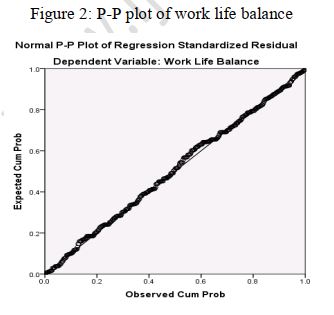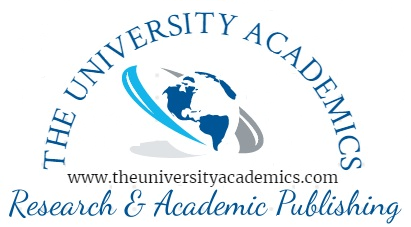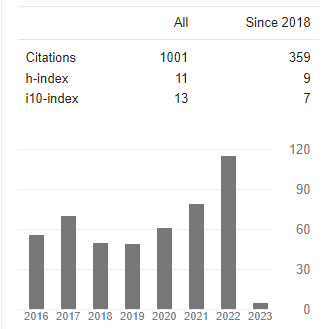THE IMPACT OF EMOTIONAL INTELLIGENCE ON WORK LIFE BALANCE: AN EMPIRICAL STUDY AMONG THE NON EXECUTIVE EMPLOYEES IN INDIAN RAILWAYS, BILASPUR ZONE
Abstract
In a changing economy managing an individual employee is more difficult than ever before. The purpose of this study is to analyze the impact of emotional intelligence on work life balance in Indian Railways Bilaspur Zone Non executive employees. The data were collected keeping in consideration feature such as gender, age, qualification, department and experience. Factor involved are work life balance and emotional intelligence with respect to difficulty balancing work and non work activities, personal life suffers because of work, family supports in my professional life, organization understanding my private life needs, management has trust me related to my job, job strain and difficulty to fulfill family duties, due to heavy workload, long working hours. Researcher collected 387 responses to different department employees. Data were collected using primary sources. Primary data were collected through questionnaires. The data was analyzed using SPSS, test applied was correlation. The finding suggests that emotional intelligence has impact on employee work life balance in Indian Railways non executive employees.- This research can be beneficial for the Indian Railways to improve their policies, benefits program and pay structure to attract more capable candidates.
Downloads
References
Bhalla, S., and Nauriyal, D. K. (2004). EI: The Emerging Paradigm, PersonnelDynamics, 49, 97- 106.
Sandhya Shelar Conceptual Study of Relationship between Emotional Intelligence & Work Life Balance in Corporate World, Chronicle Of The Neville Wadia Institute Of Management Studied And Research, 117-121, ISSN : 2230-9667.
C Srivastava, Sharat S Mathur and Thompson SH Teo (2007). “Modernization of Passenger Reservation System: Indian Railwas, Journal of Information Technology, 22, 432-439.
Campbell, D. J., Campbell, K. M. & Kennard, D. (1994). The Effects of Family Responsibilities on the Work Commitment and Job Performance of Non professional Women. Journal of Occupational and Organizational Psychology, 67, 283-296
Chinmoy Kumar (2006). Indian Railway; IT Innovations in Passenger Services, the ICFAI Journal of Service Marketing, 4(1), 64-71.
Clark, S. C. (2000). Work/Family Border Theory: A New Theory of Work/Family Balance. Human Relations, 53, 747–770.
D.V.Nalini Devi (1996). A Study of Personal Management Practices in South Central Railway and the Perceived Effectiveness of Its Operations by the Passengers. dissertation submitted to Osmania University.
Debabrata Das, Subhash Datta and A.Sharfuddin (2007). Importance of Metro Rail in Public Transport Network: A case study of Delhi. Indian Journal of Transport Management, 223.
Dette, D. E. (2005). Berufserfolg und Lebenszufriedenheit: Eine längsschnittliche Analyse der Zusammenhänge. Erlangen-Nürnberg: Friedrich-Alexander Universität.
Dundas, K (2008), Work-Life Balance: There is no ‘one-size-fits-all’ solution, in K O'Rourke (ed.), Managing Matters. Graduate College of Management, Southern Cross University, New South Wales, 3, 7-8.
Foley, S. & Powell, N. (1997). Reconceptualizing Work-Family Conflict for Business! Marriage Partner: A Theoretical Model. Journal of Small Business Management, 35(4), 36-47
Goodstein, J.D. (1994). Institutional Pressures and Strategic Responsiveness: Employer Involvement in Work-Family Issues. The Academy of Management Journal 37(2), 350- 382, Stable URL: http://www.jstor.org/stable/256833
Greenhaus, J. H., & Beutell, N.J. (1985). Sources of Conflict Between Work and Family Roles. Academy of Management Review, 10, 76-88
Greenhaus, J. H., Parasuraman, S., Granrose, C. S., Rabinowitz, S. & Beutell, N.J. (1989). Sourcesof Work-Family Conflict among Two-Career Couples. Journal of Vocational Behavior, 34, 133-153.
Grozinger, G., Matiaske, W., Tobsch, V. (2008). Arbeitszeitwünsche, Arbeitslosigkeit und Arbeitszeitpolitik. SOEP 103, DIW Berlin.
Guest, DE (2002), Perspectives on the Study of Work-life Balance, Social Science Information, 41, 255-79.
Gutek, B.A., Searle, S. and Klepa, L. (1991). Rational versus gender role explanations for workfamily conflict. Journal of Applied Psychology, 76, 560.
Hsieh, Y., Pearson, T., Chang, H., & Uen, J. (2005). Spillover between work and personal life balance for lodging managers. Journal of Human Resources in Hospitality and Tourism, 3(2), 61-83.
Ingram, P. & Simons, T. (1995). Institutional and Resource Dependence Determinants of Responsiveness to Work-Family Issues. Academy of Management Journal, 38(5), 1466- 1482. doi: 10.2307/256866
Iqan lazar, C. O. (2010). The roleof work life balance practices in order to improve organizationl performance. European Research Studies, 1-14.
J.S.Mathur (2005). Human resource management in Indian railways, A study of recruitment, training and motivation, Southern Economist, 23-25.
Jamie Dallen (2007), Sustainable Transport, Market Segmentation and Tourism: The Looe Valley Branch Line Railway, Cornwall, UK, Journal of Sustainable Tourism, 15(2), 180- 197.
Jaspe Dekkers and Piet Rietveld – “electronic ticketing in public transport: A field Study in a rural Area” –Journal of intelligent Transportation systems, 11(2), 2007, 69-78.
Jeffrey H. Greenhaus, Karen M. Collins, and Jason D. Shaw (2003), “The Relation Between Work–family. Balance and Quality of Life”, Journal of Vocational Behavior, 63, 510–531.
John Gabriel and Suresh Babu (2005). passenger reservation system in the Indian railways, The Journal of institute of Public Enterprise, 28(1&2), 77-84.
Jon Shaw (2001). Competition In the UK Passenger Railway Industry: Prospects and Problems, Transport Reviews, 21(2), 195-216.
Jonathan Cowie and Geoff Reddington (1996). Measuring eth efficiency of European railways, Applied Economics, 28, 1027-1035.
Koichi Goto (2001). “Passenger Service Technologies” Japan Railway and transport Review. Leo Kroon, Ramon Lentink and Alexandar Schrijver (2006). Shunting of passenger Train Units: An Integrated Approach, Transportation Science, 1-29.
Lewis, S., Smithson, J., & Brannen, J. (1999). Young Europeans' Orientations to Families and Work. Annals of the American Academy of Political and Social Science, 562, The Evolving World of Work and Family: New Stakeholders, New Voices, 83-97.
Luisa Affuso, Jullien Masson and David Newbery (2000). “Comparing investments on new transport infrastructure Roads Vs. Railways? - University of Cambridge, Working paper - 16185.
Lyons, J. B., and Schneider, T. R. (2005). The Influence of Emotional Intelligence on Performance, Personality and Individual Differences, 39 (4), 693-703.















